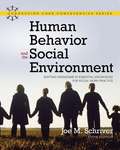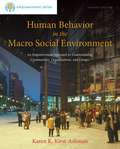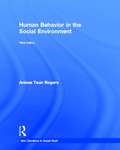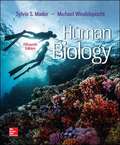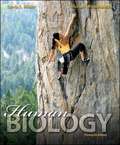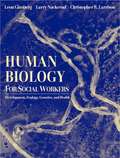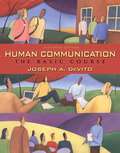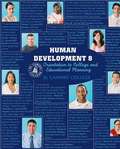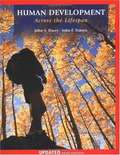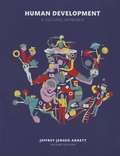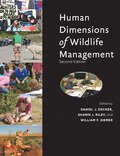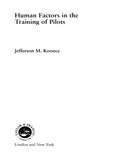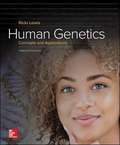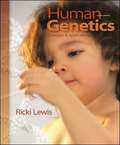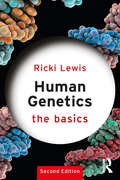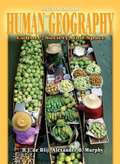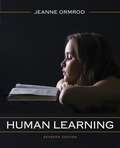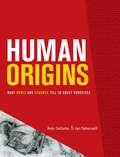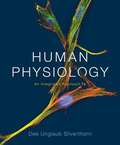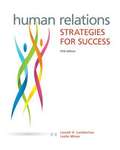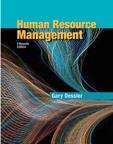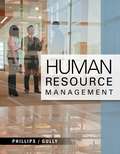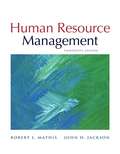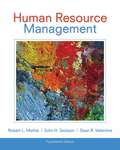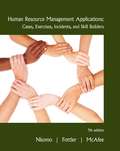- Table View
- List View
Human Behavior and the Social Environment: Shifting Paradigms in Essential Knowledge for Social Work Practice (5th edition)
by Joe M. SchriverThis textbook offers a comparative examination of competing paradigms in the study of human behavior and the social environment. The text focuses at each system level on the need for multiple perspectives that respect the diversity of persons and environments with whom social workers interact.
Human Behavior in the Macro Social Environment: An Empowerment Approach to Understanding Communities,Fourth Edition
by Karen K. Kirst-AshmanFocusing on empowerment and stressing critical thinking, this book explores human behavior in task groups, organizations, and communities. The intent is to provide a sound knowledge base for understanding how the macro social environment works and make it easier for students to apply theory in subsequent practice courses.
Human Behavior in the Social Environment
by Anissa Taun RogersThis bestseller is ideal for use in either one-semester or year-long generalist human behavior courses. Why? Because the text is concise and easily used in a one-semester course. But the text also comes with a companion set of readings and five unique cases that encourage your students to "learn by doing" and to apply their knowledge of human behavior to best practices. Go to www.routledgesw.com/hbse to learn more. These additional resources easily allow you to use the text (and its related resources) in a two-semester sequence.
Human Biology
by Sylvia S Mader<p>This revision of Human Biology, Fifteenth Edition, had the following goals: <p> <li>Updating of chapter openers, featured readings, and Connections content to focus on issues and topics important to this generation of students <li>Utilization of the data from the LearnSmart adaptive learning platforms to identify content areas within the text that students demonstrated difficulty in mastering <li>Refinement of digital assets to provide a more effective assess¬ment of learning outcomes to enable instructors in the flipped, online, and hybrid teaching environments <li>Development of a new series of videos and websites to intro¬duce relevancy and engage students in the content</li></p>
Human Biology (Thirteenth Edition)
by Sylvia S. Mader Michael WindelspechtInstructors consistently ask for a human biology textbook that helps students develop an understanding of the main themes of biology while placing the material in the context of the human body. Mader's Human Biology was developed to fill this void. To accomplish the goal of improving scientific literacy, while establishing a foundation of knowledge in human biology and physiology, Human Biology integrates a tested, traditional learning system with modern digital and pedagogical approaches designed to stimulate and engage today's student. Multimedia Integration: Michael Windelspecht represents the new generation of digital authors. Through the integration of multimedia resources, such as videos, animations and MP3 files, and in the design of a new series of guided tutorials, Dr Windelspecht has worked to bring Dr. Mader's texts to the new generation of digital learners. A veteran of the online, hybrid, and traditional teaching environments, Dr. Windelspecht is well versed in the challenges facing today's students and educators. Dr. Windelspecht guided all aspects of the Connect content accompanying Human Biology. The authors of the text identified several goals that guided them through the revision of Human Biology, Thirteenth Edition: build upon the strengths of the previous editions of the text, enhance the learning process by integrating content that appeals to today's students, deploy new pedagogical elements, including multimedia assets, to increase student interaction with the text, develop a new series of digital assets designed to engage the modern student and provide assessment of learning outcomes.
Human Biology for Social Workers: Development, Ecology, Genetics, and Health
by Leon Ginsberg Larry Nackerud Christopher LarrisonThis engaging and accessible supplemental text will give students a basic understanding of human biology and how it relates to human behavior and the social environment. It successfully integrates social work theory with human biology theory.
Human Communication: The Basic Course (11th edition)
by Joseph A. DevitoDeVito (Hunter College, City University of New York) looks at the concepts and principles that comprise all forms of communication. Emphasizing public speaking, interpersonal communication, and small group communication, the text is designed for introductory college courses in communication for students with little or no prior background in communication. A new series of boxes presents example speeches and speech outlines with suggestions for critical analysis.
Human Development 8: Orientation to College and Educational Planning
by Skip DowningHuman Development 8 is a brief orientation book to El Camino College. This text book aids and guides students in the development of skills and fulfillment of personal goals as well as their dreams
Human Development Across The Lifespan
by John S. Dacey John F. TraversThis chronologically-organized text is briefer than most of the Human Lifespan texts. Its numerous examples drawn from education, nursing, and psychology make the content relevant to students from a variety of majors and backgrounds, while a highly praised study guide integrated into the text promotes and reinforces conceptual understanding. The new edition includes increased material on cognitive development and expanded coverage of culture. .
Human Development: A Cultural Approach
by Jeffrey ArnettHelp students understand how culture impacts development – and why it matters Human Development: A Cultural Approach, Second Edition leads students to examine all stages of development through the engaging lens of culture. The first author to take a wholly cultural approach to human development, Jeffrey Arnett integrates cross-cultural examples throughout the narrative to reveal the impact of cultural factors both in the US and around the world. Arnett’s emphasis on culture fosters a thorough, balanced view of development that prepares students to face challenges in our diverse and globalized world – whether they travel the globe or remain in their hometowns.
Human Dimensions of Wildlife Management
by Daniel J. DeckerUpdated and revised, this classic work is a must-read for every student of wildlife management and every professional seeking to become a better manager.Wildlife professionals can more effectively manage species and social-ecological systems by fully considering the role that humans play in every stage of the process. Human Dimensions of Wildlife Management provides the essential information that students and practitioners need to be effective problem solvers. Edited by three leading experts in wildlife management, this textbook explores the interface of humans with wildlife and their sometimes complementary, often conflicting, interests. The book's well-researched chapters address conservation, wildlife use (hunting and fishing), and the psychological and philosophical underpinnings of wildlife management. Human Dimensions of Wildlife Management explains how a wildlife professional should handle a variety of situations, such as managing deer populations in residential areas or encounters between predators and people or pets.This thoroughly revised and updated edition includes detailed information about• systems thinking• working with social scientists• managing citizen input• using economics to inform decision making• preparing questionnaires• ethical considerations
Human Factors in the Training of Pilots
by Jefferson M. KoonceIn this educational yet entertaining text, Jeff Koonce draws on his 44 years of pilot experience and 31 years as a professor of psychology and human factors engineering in addressing the questions of how to apply sound human factors principles to the training of pilots and to one's personal flying. The author discusses principles of human f
Human Genetics
by LewisToday, human genetics is for everyone. It is about variation more than about illnesses, and increasingly about the common rather than about the rare. Once an obscure science or an occasional explanation for an odd collection of symptoms, human genetics is now part of everyday conversation. By coming to know genetic backgrounds, people can control their environments in more healthy ways. Genetic knowledge is, therefore, both informative and empowering. This edition of Human Genetics: Concepts and Applications shows students how and why that is true
Human Genetics: Concepts and Applications (Ninth Edition)
by Ricki LewisHuman Genetics: Concepts and Applications, ninth edition, is a non-science major's human genetics text that clearly explains what genes are, how they function, how they interact with the environment, and how our understanding of genetics has changed since completion of the human genome project. Meticulously updated, focused on concepts, and rich with personal stories from people whose lives are dramatically affected by the principles being discussed,Human Genetics is a textbook that will prepare the next generation of citizens for the decisions that lie ahead.
Human Genetics: The Basics (The Basics)
by Ricki LewisHuman genetics has blossomed from an obscure biological science and explanation for rare disorders to a field that is profoundly altering health care for everyone. This thoroughly updated new edition of Human Genetics: The Basics provides a concise background of gene structure and function through the lens of real examples, from families living with inherited diseases to population-wide efforts in which millions of average people are learning about their genetic selves. The book raises compelling issues concerning: • The role of genes in maintaining health and explaining sickness • Genetic testing, gene therapy, and genome editing • The common ancestry of all humanity and how we are affecting our future. Written in an engaging, narrative manner, this concise introduction is an ideal starting point for anyone who wants to know more about genes, DNA, genomes, and the genetic ties that bind us all.
Human Geography: Culture, Society, and Space
by H. J. de Blij Alexander B. MurphyAuthoritatively written by a geographer who has worked on every continent, Human Geography is sensitive to people of other cultures and from all walks of life. * Focuses on key geographic concepts and puts them in practical and current perspective. *
Human Learning
by Jeanne OrmrodThe market-leading text on learning theories applied to education, this book draws readers in with a lucid and engaging writing style. It covers a broad range of theoretical perspectives, while including numerous classroom examples of how these theories apply to learning, instruction, and assessment. The market-leading education textbook on learning theories, Human Learning looks at a broad range of theoretical perspectives, including behaviorist, social cognitive, cognitive, constructivist, contextual, and developmental theories. It describes associationistic processes, such as classical and operant conditioning, as well as more complex and distinctly human processes such as metacognition, self-regulated learning, and critical thinking. Using many concrete examples and specific classroom applications, plus a lucid, conversational writing style that truly speaks to students, the author engages students from the start, and makes the concepts, principles, and theories related to human learning and cognition meaningful.
Human Origins: What Bones and Genomes Tell Us About Ourselves
by Rob Desalle Ian TattersallEver since the recognition of the Neanderthals as an archaic form of human in the mid-nineteenth century, the fossilized bones of extinct humans have been used by paleoanthropologists to explore human origins. These bones tell the story of how the earliest humans first emerged in Africa some 6 to 7 million years ago. The bones also reveal that as humans became anatomically and behaviorally more modern, they swept out of Africa in waves into Asia, Europe, and finally into the New World. Even as paleoanthropologists continued to make important discoveries, experts in genetics were looking at the human species from a very different angle. In 1953 James Watson and Francis Crick first envisioned the double helix structure of DNA, the basic building block of all life. In the 1970s it was shown that humans share 98.7 percent of their genes with the great apes--that in fact genetically we are more closely related to chimpanzees than chimpanzees are to gorillas. And most recently the entire human genome has been mapped--we now know where each of the genes are located on the DNA strands that make up our chromosomes. In Human Origins: What Bones and Genomes Tell Us about Ourselves, two of the worlds foremost scientists, geneticist Rob DeSalle and paleoanthropologist Ian Tattersall, show how research into the human genome confirms what fossil bones have told us about human origins. This unprecedented integration of the fossil and genomic records provides the most complete understanding possible of humanity's place in nature, its emergence from the rest of the living world, and the evolutionary processes that have molded human populations to be what they are today.
Human Physiology: An Integrated Approach
by Dee Unglaub SilverthornHuman Physiology: An Integrated Approach has thorough coverage of molecular physiology seamlessly integrated into a traditional homeostasis-based systems approach.
Human Relations: Strategies for Success (Fifth Edition)
by Leslie Minor-Evans Lowell LambertonHuman Relations: Strategies for Success 5e by Lowell Lamberton and Leslie Minor will help you prepare for this changing world. This text covers time-tested, research-based social science and management principles, as well as newer theories and philosophies of human relations drawn from management theory, group theory, personality theory, and relationship theory. More than ever, effective human relations skills are crucial to business success as organizations grow and compete in a global business environment. Employees must have the knowledge and skill to adapt to a workplace where change is frequent and inevitable. Their commitment to the creation of a book that is at once interesting to read, motivating to study, and relevant to a wide variety has been the driving force behind Human Relations: Strategies for Success.
Human Resource Management
by Gary DesslerFor courses in Management. Human Resource Management provides readers with the daily tools and skills they need to function as successful managers--in both human resources and business in general. With a practical approach, the text explores the evolution of the field, highlighting the introduction of revolutionary new technologies and social media platforms such as LinkedIn and cloud computing. The Fifteenth Edition focuses on the positive impacts technology has had on the HR field. The ability to vet potential employees on the Internet shifts more HR responsibilities to managers, leaving HR departments with more time to carry out strategic, long-term endeavors for boosting employee performance and engagement. With a heavy focus on emerging industry trends, the text prepares readers with everything they need to be successful managers and HR personnel in the 21st century.
Human Resource Management
by Jean Phillips Stanley GullyThe focus of HUMAN RESOURCE MANAGEMENT is on developing students' personal and managerial skills by (1) Helping students understand the role of HR in organizational effectiveness as well as their personal career success; (2) Enabling students to understand how to flexibly apply the HR concepts that are appropriate for different problems or situations, and how HR both influences and is influenced by business strategy; and (3) Creating an understanding of the HR context by embedding the important concepts of ethics, diversity, competitive advantage, and the global context throughout the book. This highly readable book will help students understand how to use HR to hire, develop, motivate, and retain the right people and bring out the best in employees to execute the company's business strategy. It is intended for anyone who is or who might become a manager or an HR professional. By developing readers' competence and confidence in using important HR skills, this book will help anyone become a more effective manager through a better use of HR tools. Because most students learn more easily when they see the applicability of concepts to real life situations, HUMAN RESOURCE MANAGEMENT provides numerous current company examples throughout the book. A book-long integrated case supplemented with interactive online videos develops students' personal skills and gives them some experience in applying various HR concepts. The case and videos reinforce the relevance of the textbook material and make the content even more understandable.
Human Resource Management (13th Edition)
by Robert L. Mathis John H. JacksonTrust the authoritative resource for human resource management to offer the most current look at HR and its impact on today's organizations with both new and thoroughly updated cases and today's most recent examples--90 percent of which are from 2006 and beyond. Mathis/Jackson's HUMAN RESOURCE MANAGEMENT, Thirteenth Edition, is the most trusted resource and best-selling HR solution for preparing future or currently practicing HR professionals. Updated, strong academic coverage, including the latest 2009 HRCI outline, ensures this edition addresses all major topics for professional examinations (PHR, SPHR) given by the Human Resource Certification Institute (SHRM). The latest HR research and a wealth of new and proven learning features in every chapter demonstrate how HR impacts organizational strategy. Reorganized and streamlined topics examine emerging trends in technology, globalization, and HR Metrics, as well as other developments impacting the practice of HR today. A complete package of teaching and learning resources, including new CourseMate online learning tools, helps today's aspiring professionals prepare for career and future HR success.
Human Resource Management (Fourteenth Edition)
by Robert L. Mathis John H. Jackson Sean R. ValentinePrepare for career and HR success with the best-selling text that has set the standard for excellence in human resource management. Mathis/Jackson's HUMAN RESOURCE MANAGEMENT, Fourteenth Edition, offers the most current look at HRM and its impact on the success of organizations today. Whether you are a practicing or future human resource management professional, or need to prepare for HR certification, this comprehensive market-leading text clearly introduces the latest HR research and unforgettable examples of HR in action that you need for success. A leading resource in preparing for professional HR certification, this edition provides solid readable coverage to ensure you address all major topics for the PHR and SPHR professional examinations given by the Human Resource Certification Institute (SHRM). The latest HR research and an effective blend of solid theory and contemporary practice highlight emerging trends driving change in HRM today, including technology, globalization, and HR metrics. The book's accompanying CourseMate online learning tools help you further achieve professional career and HR success. Trust the authoritative resource for human resource management to offer the most current look at HR and its impact on today's organizations. Mathis/Jackson's HUMAN RESOURCE MANAGEMENT, Fourteenth Edition, is the most trusted resource and best-selling HR solution for preparing future or currently practicing HR professionals.
Human Resource Management Applications
by Stella M. Nkomo Myron D. Fottler R. Bruce McafeeStrengthen your practical understanding of today's human resource management (HRM) with this single source for actual cases, unique exercises and skill builders. HUMAN RESOURCE MANAGEMENT APPLICATIONS: CASES, EXERCISES, AND SKILL BUILDERS, 7E focuses on the abilities most important in HRM today with timely new cases and applications drawn from a variety of real organizations, including those in today's growing service sector. Learn to effectively handle some of today's controversial issues, such as environmentally friendly HR policies, the use of social networking, and same-sex benefits. This book perfectly complements your study of introductory human resource management with brief, yet powerful, exercises and a comprehensive project that helps you refine the skills most important for success in any HRM or business career.
